Key takeaways:
- Recognizing personal biases in religion is crucial for understanding diverse perspectives and fostering empathy.
- Engaging in religious education and open conversations helps challenge stereotypes and promote critical thinking about beliefs.
- Active listening and stepping outside comfort zones are essential for developing empathy towards others and their experiences.
- Reflection on personal reactions and assumptions can facilitate growth and lead to a deeper understanding of faith and humanity.
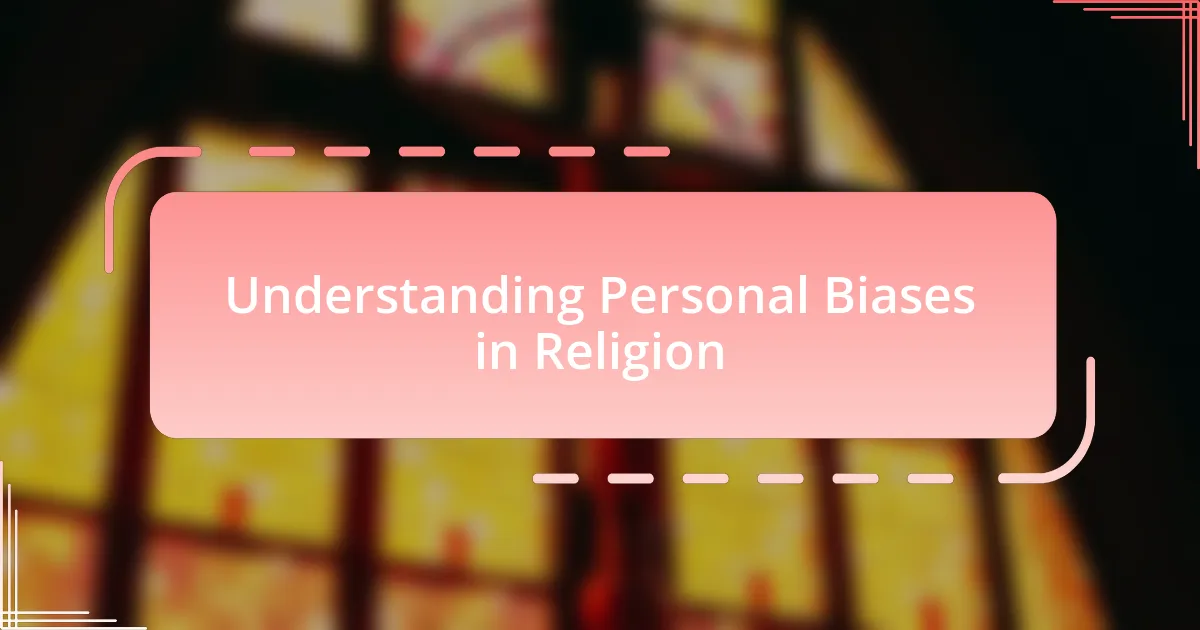
Understanding Personal Biases in Religion
Understanding our personal biases in religion is a complex endeavor. I vividly recall a moment during a group discussion where my automatic assumptions about a particular faith surfaced. It struck me that these biases could cloud my understanding, making me wonder, how often do we allow preconceived notions to shape our views?
In another instance, I attended a service outside my religious background. Initially, I felt a sense of discomfort, but as I immersed myself in the experience, I began to grasp the beauty and depth of their traditions. This left me questioning: how much do we miss when we hold tightly to our biases, dismissing the richness of other beliefs?
For me, examining these biases was not just an intellectual exercise; it was deeply emotional. I found myself asking if my reluctance to engage with diverse perspectives stemmed from fear of the unknown. This reflection has led me to appreciate the value of empathy in bridging the gaps created by our biases.

Importance of Religious Education
Religious education serves as a crucial foundation for fostering understanding and tolerance among diverse cultures and beliefs. I remember attending a seminar where individuals from various faith backgrounds shared their narratives. It was profound to realize how much we could learn from one another’s experiences; those stories illuminated the beautiful tapestry of humanity and made me think: what if everyone had the chance to hear these perspectives?
Moreover, religious education can challenge the stereotypes that often lead to division. I once mentored a group of high school students exploring different religions through a project. Watching them engage openly transformed my approach to dialogue about faith. It was a clear reminder that education can dismantle fears and assumptions, prompting the question: how might we transform our communities if we prioritized open and respectful discussions about beliefs?
Lastly, engaging with religious education promotes critical thinking skills that are vital in today’s society. Reflecting on my own educational journey, I can point to moments when grappling with theological debates sharpened my understanding of complex concepts. This inquiry-driven approach inspires curiosity and compassion, leading me to wonder: aren’t these qualities essential for a harmonious society?
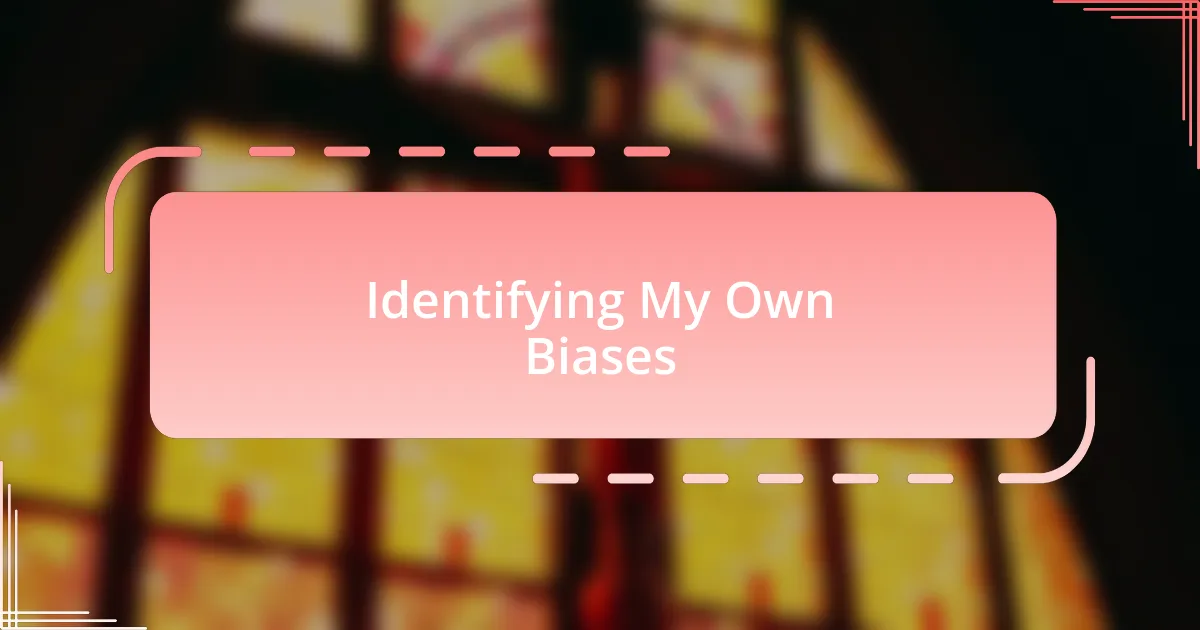
Identifying My Own Biases
Recognizing my own biases was a vital step in my journey toward understanding others’ perspectives. I distinctly recall a time when I felt discomfort during discussions about a certain religious belief. That uneasiness nudged me to reflect deeply: what was it about that belief that triggered my reaction? Reflecting on my upbringing helped me see that personal experiences can heavily color our views, pushing me to confront the origins of my discomfort.
As I explored various religious texts and engaged with people from different faiths, I noticed recurring patterns in my judgments. There was a moment during a community event when I caught myself making assumptions about someone’s practices based solely on stereotypes I had heard. This realization was unsettling, but it drove me to ask some challenging questions: why do I hold these assumptions? How often do I allow preconceived notions to overshadow the individuality of others?
The process of identifying my biases hasn’t been straightforward, but it has been enlightening. I remember journaling my thoughts after a meaningful conversation with a friend from a different faith tradition. In that quiet reflection, I recognized how my biases were not just personal but societal—all tangled in historical narratives. It made me wonder, if I can unravel my biases, what conversations might I cultivate that could lead to deeper connections?
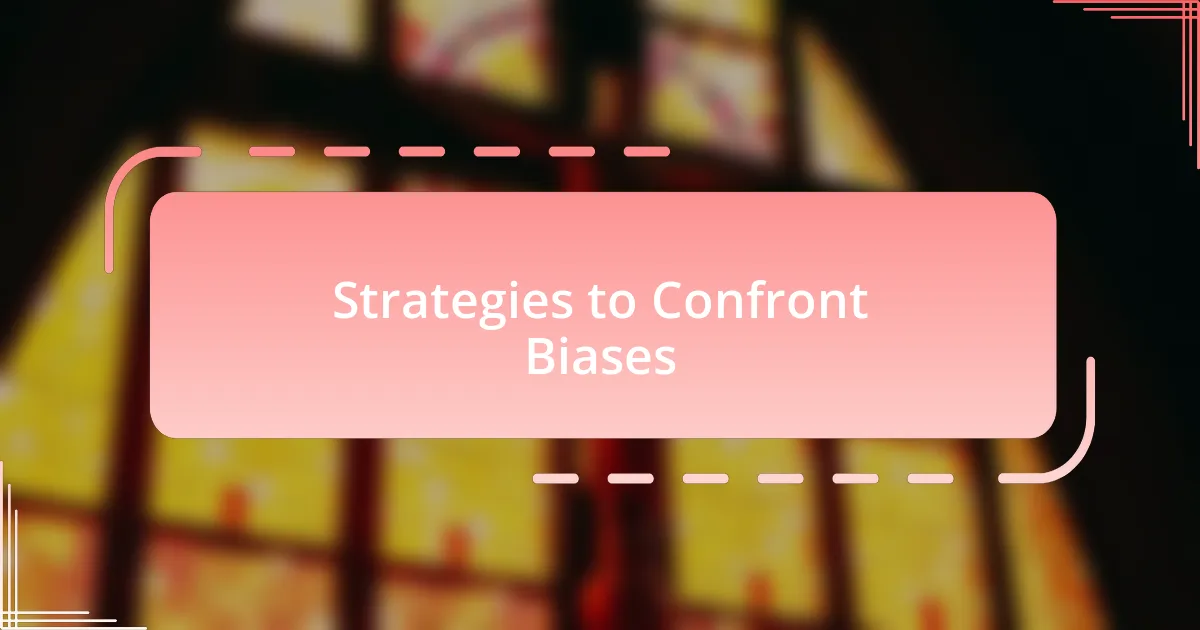
Strategies to Confront Biases
When I decided to confront my biases, I first turned to education. I dove into literature and resources from various religious perspectives, seeking to understand experiences different from my own. I recall reading a book about interfaith dialogue that challenged my assumptions and stirred a sense of empathy within me; I began to realize that the more I learned, the more my perspective widened. How often do we limit ourselves by confining our knowledge to what we already believe?
Another strategy that proved invaluable was engaging in open conversations with individuals from diverse backgrounds. I remember attending a discussion group where each person shared their beliefs and the personal stories behind them. This experience not only helped me see the humanity in different practices but also illuminated how often I had categorized others based on preconceived notions. It sparked a powerful question: how can meaningful dialogues reshape our understanding of faith and community?
Self-reflection played a crucial role in this journey. After attending various religious celebrations, I would take time to sit quietly and reflect. I felt a wave of gratitude for the insights gained, but I also recognized discomfort creeping in when I noticed my biases surfacing again. This prompted me to ask myself, am I truly integrating these experiences into my understanding, or am I merely ticking a box? Embracing discomfort can be a catalyst for growth, and I learned that confronting biases requires continuous effort and intention.
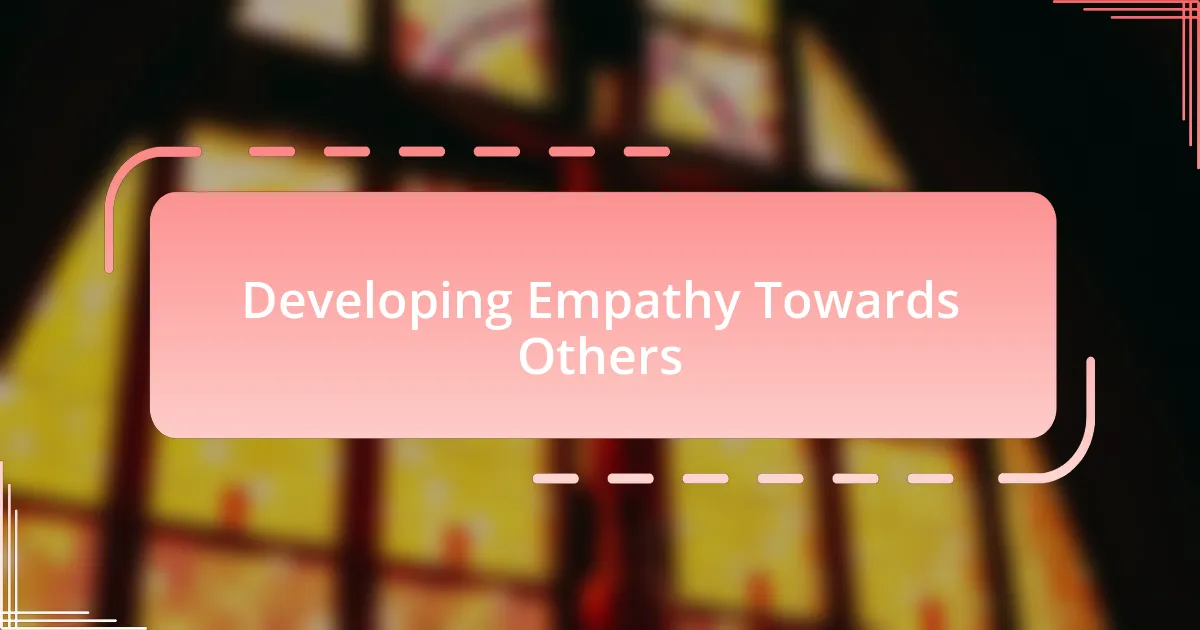
Developing Empathy Towards Others
As I navigated my journey to develop empathy towards others, I soon realized the profound impact of active listening. I recall a moment during a community event when I simply sat down next to someone I didn’t know. By allowing myself to hear their story without the urge to interject my own opinions, I felt a genuine connection bloom. Isn’t it fascinating how simply tuning in can break down barriers and open our hearts to understanding?
It also became clear to me that stepping outside of my comfort zone was essential for cultivating empathy. One day, I volunteered at a local shelter where individuals from various backgrounds shared their challenges. Each story weighed heavily on my heart, yet it sparked a deeper compassion within me. How often do we shy away from unfamiliar environments that could teach us valuable lessons about our shared humanity?
In reflecting on my experiences, I recognized that empathy is an ever-evolving process rather than a destination. I’ve often found myself in situations where my biases resurfaced, especially when confronted with differing beliefs. In those moments, I’ve learned to pause and question my reactions: What if I approached these differences with curiosity instead of judgment? Embracing this mindset has underscored that empathy is not just about understanding others but also about continuously learning and growing from our own experiences.
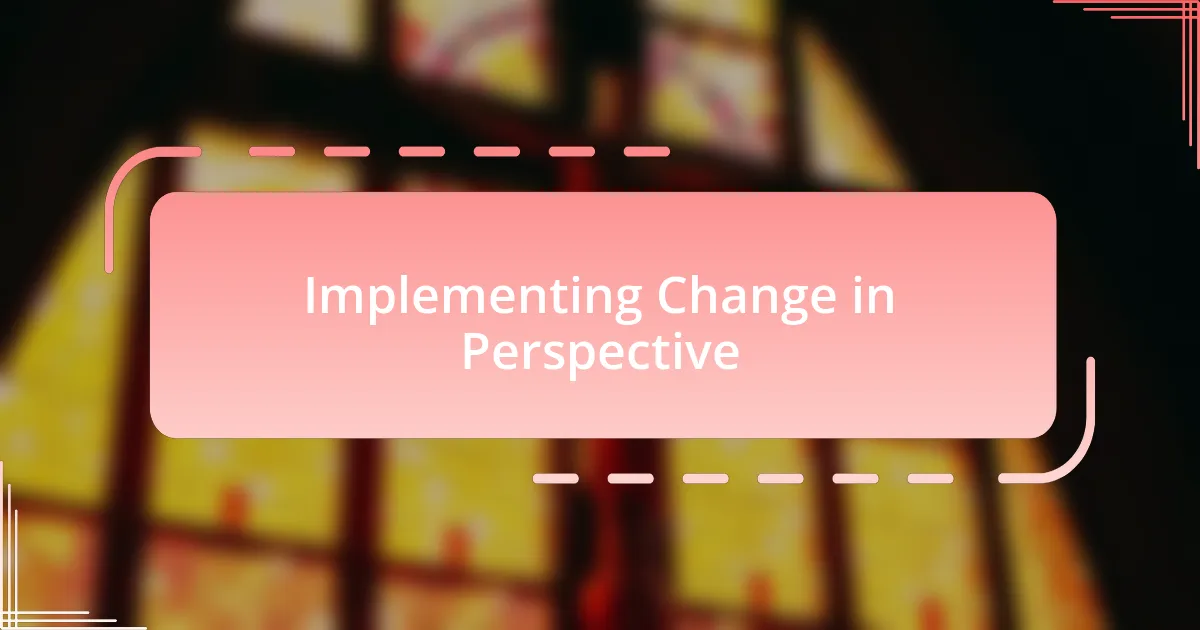
Implementing Change in Perspective
As I sought to implement change in my perspective, I discovered the power of reflection. I recall sitting alone on a park bench one afternoon, reflecting on a debate I had over lunch about religious beliefs. Instead of focusing solely on my viewpoint, I began to ponder the emotions behind the other person’s perspective. This tiny shift led me to question my assumptions: What drives someone to feel so strongly about their faith? Why do I instinctively push back against views that differ from my own?
Engaging with diverse narratives has been another catalyst for change. I once attended a panel discussion featuring speakers from various religious backgrounds. Listening to their experiences opened my eyes to aspects of faith I had previously overlooked. I felt an emotional awakening as their stories mirrored struggles common to all humanity. It left me wondering, what if we all stepped back and centered these stories in our discussions rather than the differences?
Finally, I realized the value of deliberate practice in changing my perspective. I started journaling my biases and how they impacted my interactions with others. With each entry, I unearthed layers of ingrained thinking I didn’t even recognize at first. It made me ask myself: Am I willing to let go of preconceived notions for the sake of understanding? That questioning has become essential in my personal growth journey.
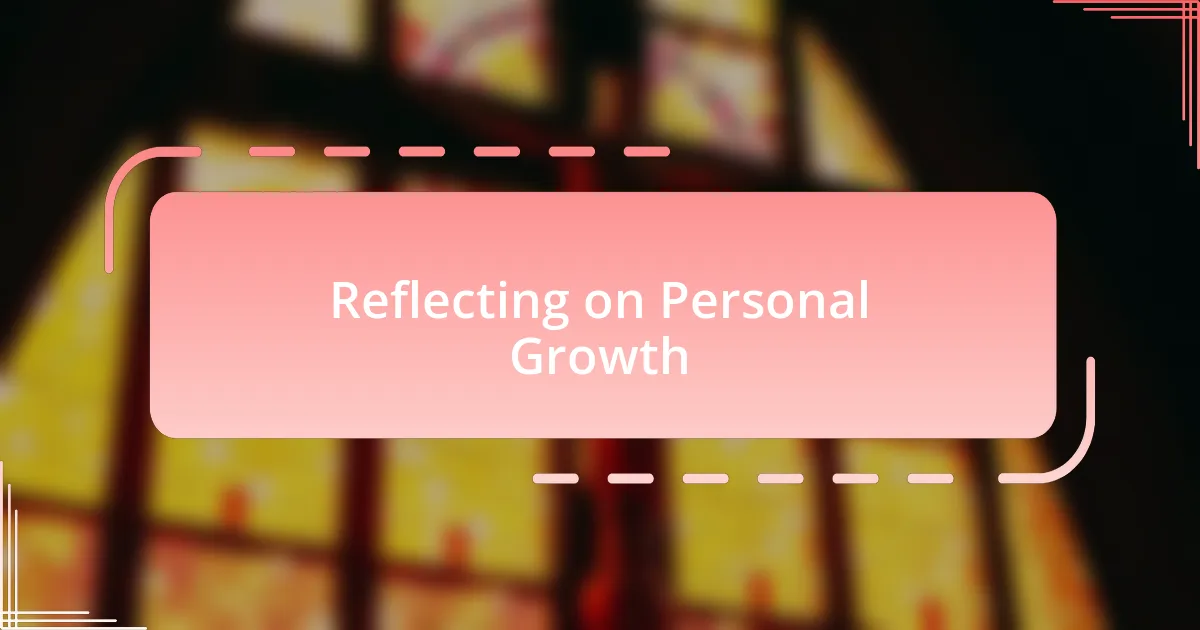
Reflecting on Personal Growth
Reflecting on my personal growth has been an enlightening process, often marked by moments of discomfort. I remember a time when I found myself struggling in a group discussion about religious tolerance. As my peers offered insights rooted in their own experiences, I felt a wave of defensiveness. It was this very reaction that sparked a pivotal realization—why was I so quick to defend my stance when there was so much to learn from their stories?
I’ve also noticed that vulnerability plays a crucial role in this growth journey. There was a workshop I attended where we were invited to share our biases openly. As I listened to others bravely disclose their struggles, I felt a connection that transcended our differing beliefs. This shared vulnerability not only fostered empathy but also pushed me to confront biases I had long avoided, reshaping how I engage with others.
Processing these experiences requires ongoing reflection. I often find myself revisiting certain conversations weeks later, examining what I could have done differently. Did I really listen, or was I just waiting for my turn to speak? Each of these reflections contributes to a deeper understanding of myself and the world around me, reinforcing that growth is not merely a destination but a continuous journey filled with learning opportunities.